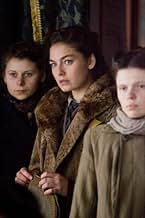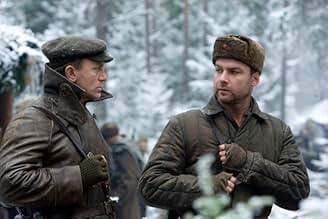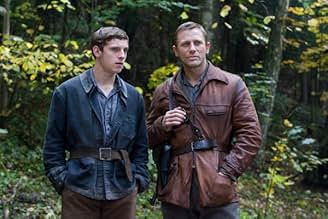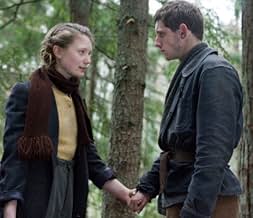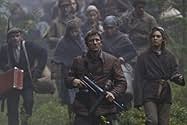I fratelli ebrei fuggono nelle foreste bielorusse, dove si uniscono ai combattenti della resistenza russa e si impegnano a costruire un villaggio, al fine di proteggere se stessi e circa un ... Leggi tuttoI fratelli ebrei fuggono nelle foreste bielorusse, dove si uniscono ai combattenti della resistenza russa e si impegnano a costruire un villaggio, al fine di proteggere se stessi e circa un migliaio di ebrei.I fratelli ebrei fuggono nelle foreste bielorusse, dove si uniscono ai combattenti della resistenza russa e si impegnano a costruire un villaggio, al fine di proteggere se stessi e circa un migliaio di ebrei.
- Regia
- Sceneggiatura
- Star
- Candidato a 1 Oscar
- 2 vittorie e 5 candidature totali
Recensioni in evidenza
"Defiance" is a very entertaining, exciting, suspenseful, and inspirational film about a tough topic: the Holocaust. Its many action sequences are well-paced and well-motivated. You know exactly why Tuvia Bielski (Daniel Craig) breaks into a home and points a gun at a man in front of his family. Daniel Craig and Live Schreiber are terrific as Tuvia and Zus Bielski, who lead a band of Jewish forest partisans during World War Two, thus saying over a thousand lives.
The movie is not perfect. Characters speak English with Slavic accents. In other scenes, they speak Russian or Belarusian. Craig and Schreiber manage very good Slavic accents, both when speaking English and when speaking the Slavic languages, but Craig occasionally lapses into his English accent when speaking English. Female characters are not particularly well drawn, or given much to do. While this film is very good, it doesn't have the production values to be a timeless classic like "Schindler's List." The movie is controversial. Most of the controversies are shallow relative to the most important facts at hand. Many of those attacking this movie have axes to grind, including current events in the Middle East or feuds between Poles and Jews. The most important fact is this: the Nazis committed a genocide of six million Jews. In the midst of this Satanic nightmare, the Bielskis managed to save over a thousand Jews. That's the main, and absolutely true, point here, and it should not be lost in bickering over details.
Compared to other treatments of the Holocaust, this film is fair. It doesn't show Slavic peasants as uniformly Jew-hating collaborators. Nazis, not Slavic peasants, were the authors and perpetrators of the Holocaust. Some occupied peoples collaborated, often out of fear and for financial gain or as payback for old grudges. Some occupied peoples did everything they could to help Jews, as does a Belarusian peasant in this film.
The Bielskis were not immaculate. They did summarily execute captured Germans, as shown here. They did raid peasants for provisions, as shown here. They did work with the Soviets, but so did Uncle Sam. Remember that photo of FDR and Churchill smiling with Stalin at Yalta. The Polish IPN institute is investigating charges that members of the Bielski partisans, but not the Bielskis themselves, participated in the 1943 Soviet massacre of 128 people in Naliboki. Aron, the youngest Bielski brother, was, in 2007, accused of defrauding an elderly Polish woman. These failures of the Bielski brothers to be perfect in no way lessen their achievement, any more than any failure to be perfect lessen any hero's achievement. Again, in the face of genocide, the Bielski brothers managed to save over a thousand people. Were they perfect? No. Were they admirable, heroic, and worth learning about? Absolutely yes.
The movie is not perfect. Characters speak English with Slavic accents. In other scenes, they speak Russian or Belarusian. Craig and Schreiber manage very good Slavic accents, both when speaking English and when speaking the Slavic languages, but Craig occasionally lapses into his English accent when speaking English. Female characters are not particularly well drawn, or given much to do. While this film is very good, it doesn't have the production values to be a timeless classic like "Schindler's List." The movie is controversial. Most of the controversies are shallow relative to the most important facts at hand. Many of those attacking this movie have axes to grind, including current events in the Middle East or feuds between Poles and Jews. The most important fact is this: the Nazis committed a genocide of six million Jews. In the midst of this Satanic nightmare, the Bielskis managed to save over a thousand Jews. That's the main, and absolutely true, point here, and it should not be lost in bickering over details.
Compared to other treatments of the Holocaust, this film is fair. It doesn't show Slavic peasants as uniformly Jew-hating collaborators. Nazis, not Slavic peasants, were the authors and perpetrators of the Holocaust. Some occupied peoples collaborated, often out of fear and for financial gain or as payback for old grudges. Some occupied peoples did everything they could to help Jews, as does a Belarusian peasant in this film.
The Bielskis were not immaculate. They did summarily execute captured Germans, as shown here. They did raid peasants for provisions, as shown here. They did work with the Soviets, but so did Uncle Sam. Remember that photo of FDR and Churchill smiling with Stalin at Yalta. The Polish IPN institute is investigating charges that members of the Bielski partisans, but not the Bielskis themselves, participated in the 1943 Soviet massacre of 128 people in Naliboki. Aron, the youngest Bielski brother, was, in 2007, accused of defrauding an elderly Polish woman. These failures of the Bielski brothers to be perfect in no way lessen their achievement, any more than any failure to be perfect lessen any hero's achievement. Again, in the face of genocide, the Bielski brothers managed to save over a thousand people. Were they perfect? No. Were they admirable, heroic, and worth learning about? Absolutely yes.
When I think of World War 2 films, I usually think of graphic war scenes, Holocaust themes, or military strategy. This film takes a completely different approach to the WW2 era, showing it from the point of view of a group of Jewish citizens trying to avoid capture and survive out in the woods.
For a basic plot summary, this film focuses on the two eldest Bielski brothers (Tuvia & Zus), who lead a band of fleeing Jews into the woods when the Germans begin to invade Eastern Europe. While out in the Belarussian forest, the Bielski boys must not only feed hungry mouths and keep away from the Germans, but also navigate through different political/military strategies and the shady Russian army (in which you never know who to trust).
This movie may not be an all-time classic, but it is a very solid WW2 tale told from a perspective I'm not accustomed to (and thus rather fresh). Being based on a true story, it is remarkable to consider the odds that the vagrant Jews faced just to survive each day, nonetheless maintain their freedom.
The two acting leads (Daniel Craig & Liev Schreiber) are very compelling, while none of the auxiliary cast are exceptionally bad. Though it is a bit slow in the beginning, by the end the plot/characters will really have you rooting for success.
Thus, I recommend this film to WW2 enthusiasts of all kind. If you don't expect a masterpiece, and are content with a good story from a new angle, you will enjoy this film very much.
For a basic plot summary, this film focuses on the two eldest Bielski brothers (Tuvia & Zus), who lead a band of fleeing Jews into the woods when the Germans begin to invade Eastern Europe. While out in the Belarussian forest, the Bielski boys must not only feed hungry mouths and keep away from the Germans, but also navigate through different political/military strategies and the shady Russian army (in which you never know who to trust).
This movie may not be an all-time classic, but it is a very solid WW2 tale told from a perspective I'm not accustomed to (and thus rather fresh). Being based on a true story, it is remarkable to consider the odds that the vagrant Jews faced just to survive each day, nonetheless maintain their freedom.
The two acting leads (Daniel Craig & Liev Schreiber) are very compelling, while none of the auxiliary cast are exceptionally bad. Though it is a bit slow in the beginning, by the end the plot/characters will really have you rooting for success.
Thus, I recommend this film to WW2 enthusiasts of all kind. If you don't expect a masterpiece, and are content with a good story from a new angle, you will enjoy this film very much.
I've registered here just to write that I'm amazed by some reviews pointing that Zwick was inaccurate or illiterate when making his film. And it's really amusing to read that 'partisans couldn't speak Russian because Naliboki was a Polish town'.
Naliboki is a town in the very center of present Belarus. It's a point were cultures mixed. For many centuries everybody here mastered at least 3 languages, and elder Belski spoke 6 of them: Yiddish, Hebrew, Polish, Belarusian, Russian, German. It's not so impossible, I may assure you:)
Actually, Russian is appropriate only in episodes when Zus Belski talks to a Soviet partisans' commander - that guy was from Moscow. I'm pretty sure, that in reality Jews talked to their neighbors in Yiddish and got answers in Polish or Belarusian. As for Belskies, they where the only Jewish family in their village, so they should master Slavic languages perfectly.
Naliboki is a town in the very center of present Belarus. It's a point were cultures mixed. For many centuries everybody here mastered at least 3 languages, and elder Belski spoke 6 of them: Yiddish, Hebrew, Polish, Belarusian, Russian, German. It's not so impossible, I may assure you:)
Actually, Russian is appropriate only in episodes when Zus Belski talks to a Soviet partisans' commander - that guy was from Moscow. I'm pretty sure, that in reality Jews talked to their neighbors in Yiddish and got answers in Polish or Belarusian. As for Belskies, they where the only Jewish family in their village, so they should master Slavic languages perfectly.
Read more at http://FrameRate.blog.com
When most people learn about World War II during their American History classes, they hear all about the major stories and the major players: D-Day, Eisenhower, the Holocaust, Hitler, Axis vs. Allies, Battle of the Bulge, but there are literally thousands of lesser-known stories from that era that many have not yet heard. It was one such obscure story that is the basis for the film Defiance, starring Daniel Craig.
The film begins with a familiar theme -- Nazi soldiers rounding up Jews in Western Europe. The grainy, black-and-white style tells us that this is a true story. However, as events unfold, we realize that this isn't the Holocaust story that we're accustomed to seeing in films like Schindler's List. In fact, it's a story about hundreds of Jews who fight for survival as free men and women in the dense and expansive forests of Nazi-occupied Poland.
Daniel Craig gives perhaps one of his best performances as Tuvia Bielski, the eldest of four Jewish brothers and the eventual leader of the Bielski partisans. Although the Bielski's and fellow Jews are forced to watch as their people are rounded up and killed by the Nazis, Tuvia wants to avoid becoming a group of vigilantes. The conflict arises from younger brother Zus (Liev Schreiber) who desperately wants to avenge the deaths of those he loved. Tuvia is conflicted by the knowledge that in extreme circumstances one must often take extreme measures in order to survive and protect others.
Throughout the film tension is woven by utilizing a number of different methods, all of which make the movie much more compelling. First, as mentioned, is the conflict between fighting and surviving. Second, is the suspense created by the knowledge that the Nazis are closing in around them. Third is the conflict between the Bielskis and the local police who are loyal to the Nazis. Fourth is the inner struggles the Bielskis face when some of their own decide to cause disagreements and divisions. For those unfamiliar with the story, the fate of the Bielskis is constantly in doubt.
The cinematography of the film is gray and muted, reflective of the somber tone of the subject matter. The musical score is reminiscent of John William's score in Schindler's List -- soft and sad with the cello and violin taking the melody. In some ways it feels that Defiance takes its visual cues from Schindler's List as well; there's something about the look of the movie that seems familiar. The battle scenes are similar in style to Saving Private Ryan, complete with the dazed, ringing-in-the-ears experience following a grenade that goes off too close to Tuvia. I would have appreciated a more unique perspective to the aesthetics of the film to coincide with the uniqueness of the story.
In all, Defiance is an important story that needs to be heard. Daniel Craig leads a great cast of characters in an emotional journey of community, camaraderie, and hope.
When most people learn about World War II during their American History classes, they hear all about the major stories and the major players: D-Day, Eisenhower, the Holocaust, Hitler, Axis vs. Allies, Battle of the Bulge, but there are literally thousands of lesser-known stories from that era that many have not yet heard. It was one such obscure story that is the basis for the film Defiance, starring Daniel Craig.
The film begins with a familiar theme -- Nazi soldiers rounding up Jews in Western Europe. The grainy, black-and-white style tells us that this is a true story. However, as events unfold, we realize that this isn't the Holocaust story that we're accustomed to seeing in films like Schindler's List. In fact, it's a story about hundreds of Jews who fight for survival as free men and women in the dense and expansive forests of Nazi-occupied Poland.
Daniel Craig gives perhaps one of his best performances as Tuvia Bielski, the eldest of four Jewish brothers and the eventual leader of the Bielski partisans. Although the Bielski's and fellow Jews are forced to watch as their people are rounded up and killed by the Nazis, Tuvia wants to avoid becoming a group of vigilantes. The conflict arises from younger brother Zus (Liev Schreiber) who desperately wants to avenge the deaths of those he loved. Tuvia is conflicted by the knowledge that in extreme circumstances one must often take extreme measures in order to survive and protect others.
Throughout the film tension is woven by utilizing a number of different methods, all of which make the movie much more compelling. First, as mentioned, is the conflict between fighting and surviving. Second, is the suspense created by the knowledge that the Nazis are closing in around them. Third is the conflict between the Bielskis and the local police who are loyal to the Nazis. Fourth is the inner struggles the Bielskis face when some of their own decide to cause disagreements and divisions. For those unfamiliar with the story, the fate of the Bielskis is constantly in doubt.
The cinematography of the film is gray and muted, reflective of the somber tone of the subject matter. The musical score is reminiscent of John William's score in Schindler's List -- soft and sad with the cello and violin taking the melody. In some ways it feels that Defiance takes its visual cues from Schindler's List as well; there's something about the look of the movie that seems familiar. The battle scenes are similar in style to Saving Private Ryan, complete with the dazed, ringing-in-the-ears experience following a grenade that goes off too close to Tuvia. I would have appreciated a more unique perspective to the aesthetics of the film to coincide with the uniqueness of the story.
In all, Defiance is an important story that needs to be heard. Daniel Craig leads a great cast of characters in an emotional journey of community, camaraderie, and hope.
James Bond and Oscar winning director Ed Zwick take on the Nazis.
Saw a preview screening of DEFIANCE last week in Woodland Hills. Daniel Craig stars as Tuvia Bielski in the true WWII story of three Jewish brothers who hid in the Belorussian forests and built a community of partisan fighters, saving over 1200 Jews by war's end.
Liev Schreiber (Zus Bielski) and Jamie Bell (Asael Bielski) star alongside Craig as his two younger brothers. Both Craig and Schreiber give powerhouse performances as the older brothers competing for leadership, and Jamie Bell, who most recently starred in the abysmal Jumper, gives a surprisingly great performance as well.
Zwick has created one of the most beautiful and thought provoking films of his career and definitely one of the most Oscar worthy movies to hit cinemas in years. War and destruction has never been so captivating and moving. There have been dozens of war movies in recent years but none have left me caring so much or feeling so attached to the characters. My eyeballs wouldn't break from the screen for the full 120 mins, and by the film's end, I wasn't ready to stop watching. I can't wait for the release (which appears to be some time this winter) in order to see it again.
It's a superb film with a nice balance of heavy hitting action and intense drama, but if that's not enough to make you want to see it, just the fact that these on screen heroes existed in real life definitely make it worth the watch.
This is a WWII movie that doesn't hide or glamorize war but shows the intense reality of what happens when people band together against overwhelming evil and survive.
A solid 8.5/10
Saw a preview screening of DEFIANCE last week in Woodland Hills. Daniel Craig stars as Tuvia Bielski in the true WWII story of three Jewish brothers who hid in the Belorussian forests and built a community of partisan fighters, saving over 1200 Jews by war's end.
Liev Schreiber (Zus Bielski) and Jamie Bell (Asael Bielski) star alongside Craig as his two younger brothers. Both Craig and Schreiber give powerhouse performances as the older brothers competing for leadership, and Jamie Bell, who most recently starred in the abysmal Jumper, gives a surprisingly great performance as well.
Zwick has created one of the most beautiful and thought provoking films of his career and definitely one of the most Oscar worthy movies to hit cinemas in years. War and destruction has never been so captivating and moving. There have been dozens of war movies in recent years but none have left me caring so much or feeling so attached to the characters. My eyeballs wouldn't break from the screen for the full 120 mins, and by the film's end, I wasn't ready to stop watching. I can't wait for the release (which appears to be some time this winter) in order to see it again.
It's a superb film with a nice balance of heavy hitting action and intense drama, but if that's not enough to make you want to see it, just the fact that these on screen heroes existed in real life definitely make it worth the watch.
This is a WWII movie that doesn't hide or glamorize war but shows the intense reality of what happens when people band together against overwhelming evil and survive.
A solid 8.5/10
Lo sapevi?
- QuizThe film was shot in a remote, wooded area in Lithuania, about a hundred miles away from the real location of the Bielski brothers camp.
- BlooperZus and some others go to the police station to get Ampicillin to treat the pneumonia that is common in the camp. Ampicillin did not come into clinical use until 1961. Even "simple" penicillin would not have been available in Belorussia in the early 1940s.
- Citazioni
Tuvia Bielski: Our revenge is to live.
- ConnessioniFeatured in 2009 Golden Globe Awards (2009)
I più visti
Accedi per valutare e creare un elenco di titoli salvati per ottenere consigli personalizzati
Dettagli
Botteghino
- Budget
- 32.000.000 USD (previsto)
- Lordo Stati Uniti e Canada
- 28.644.813 USD
- Fine settimana di apertura Stati Uniti e Canada
- 123.513 USD
- 4 gen 2009
- Lordo in tutto il mondo
- 51.262.751 USD
- Tempo di esecuzione2 ore 17 minuti
- Colore
- Mix di suoni
- Proporzioni
- 1.85 : 1
Contribuisci a questa pagina
Suggerisci una modifica o aggiungi i contenuti mancanti









